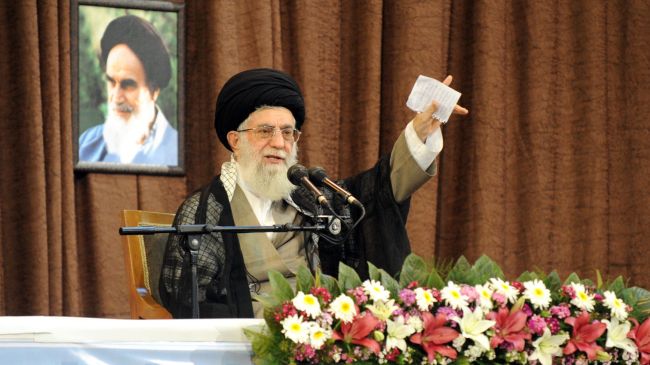 Leader of the Islamic Revolution Ayatollah Seyyed Ali Khamenei speaks following a visit to MAPNA industrial complex in the city of Karaj on April 30, 2014[/caption]
Leader of the Islamic Revolution Ayatollah Seyyed Ali Khamenei speaks following a visit to MAPNA industrial complex in the city of Karaj on April 30, 2014[/caption]The fatwa by Leader of the Islamic Revolution Ayatollah Seyyed Ali Khamenei against the development of nuclear weapons is addressed to all world countries, an analyst tells Press TV.
�I wish the world leaders and the mass media would pay more attention and engage in more dialogue about the importance of this religious fatwa that prohibits production and use of nuclear weapons,� Imam Mohammad Ali Elahi told Press TV in an interview.
On February 22, 2012, Ayatollah Khamenei said the Islamic Republic considers the pursuit and possession of nuclear weapons �a grave sin� from every logical, religious and theoretical standpoint.
Elahi said nuclear weapons seriously threaten the �destiny of humanity and democracy,� adding, �The wisdom of this message [of Ayatollah Khamenei] is that all of us work together to bring dialogue instead of deception and destruction...; to end violence and terrorism and extremism instead of bringing more threat.�
Elahi stated that nuclear weapons must be prohibited so that they would never fall into the hands of terrorist groups like al-Qaeda who �would not hesitate to use� them against humanity.
�So we need to learn the lesson from our faith traditions and also moral principles to pay more attention to this message,� he said.
Iran has repeatedly called for turning the Middle East into a region free of nuclear weapons.
Israel is widely believed to be the only possessor of nuclear arms in the Middle East, with an estimated stockpile of 200-400 nuclear warheads. In its Yearbook 2012, the Stockholm International Peace Research Institute (SIPRI) said Israel possesses at least 80 �highly operational� nuclear warheads.
The Israeli regime, which rejects all international nuclear regulatory agreements, maintains a policy of deliberate ambiguity over its nuclear activities and refuses to allow its nuclear facilities to come under international regulatory inspections.
By Press TV
The Iran Project is not responsible for the content of quoted articles.










